Art as a conduit for deep, integrated learning
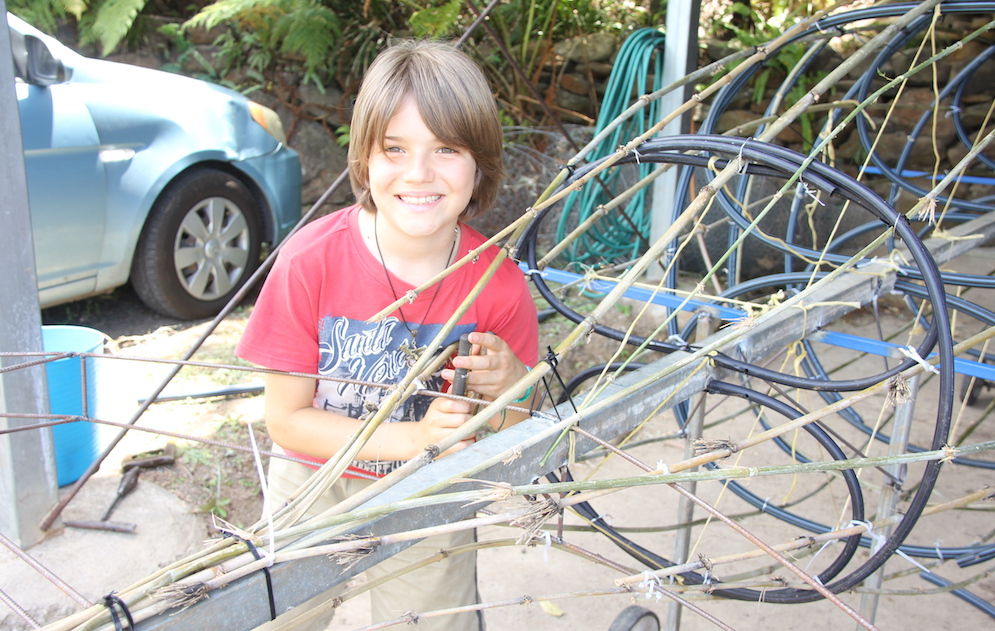
I teach visual arts, media arts, and cultural studies at the River School, an independent Queensland school, educating students from early childhood to year six.
Our school has its own open-air art shed and all students enjoy a 1-1.5-hr art lesson per week with a dedicated arts and cultural studies teacher; that’s me. I’m here because, at the River School, the arts are highly valued and are integrated into other subject areas across the school to enhance learning. This is achieved through cross-curricular collaboration.

Art is not just a specialist area of study at the River School; it’s a context through which other learning outcomes can be realised, and core skills such as critical thinking and problem solving are developed.
Each term, I consult with class teachers to familiarise myself with their unit focus for the term, so I can plan art lessons that not only exercise the students’ artistic expression and teach new visual arts skills, but also enhance the synthesis and integration of class learning, using a different pedagogical approach.
Harnessing the potential of art in this way results in richer and more meaningful learning experiences for students. In their art classes, students are able to engage with new ideas and concepts in diverse ways, using hands-on artistic processes and materials to integrate and extend their learning.
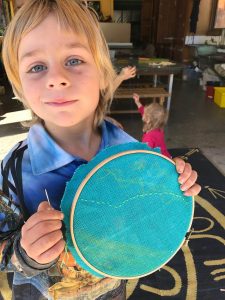
For example, to support the historical focus of the prep to year two multi-age class this term, we explored colonial arts and crafts; that is handicrafts that would have been a necessity for early settlers. Once students were taught the basic stitches, they became self-directed and began to innovate; making everything from bags to dog blankets – with some students extending their learning during lunchtimes and making their own shirts! This young cohort was excited and engaged by this hands-on craft. They used embroidery hoops, recycled wool blankets and learnt how to eco-dye the material, using the natural colours from native eucalypts.

Our year five students began a focused study on the life cycle, habitat, and ecological situation of whales. The class decided they wanted to make a whale calf to scale, so, in art we did just that! Why not? This ambitious art idea, generated by the students, became a community-building exercise, calling on the skills of talented parents and staff within our school community to support our students’ vision. Our young artists learnt completely new skills during the building phase of this sculpture, and their expert knowledge about the humpback whale is now deeply embedded.
After being showcased to wider audiences at public events, ‘Alberto’ the whale now inhabits a special platform on top of our school rainwater tank; a permanent installation to remind students and visitors about the need for custodianship of the earth. It’s also an everyday reminder to our students that art is a powerful means of communication and inspiration.
 Students from year two to six participate in the media arts curriculum through engagement with stop motion animation projects. Students love to work with this technology and model their representations of the world using plasticine.
Students from year two to six participate in the media arts curriculum through engagement with stop motion animation projects. Students love to work with this technology and model their representations of the world using plasticine.
Students work with the theme they have studied in class, and use the technology to creatively communicate a concept or viewpoint, or to tell a story. This process fuses hands-on learning with technology and can be a powerful way to complete a unit of work and show student understanding.
Currently, students in year three are making an animation about ‘nomads of the world’ and the year two students are making an animation featuring ‘inventions of the world.’ Other past examples include animation projects retelling the story of the Lorax, showing how humans have migrated across the world, and sharing facts about endangered animals.
Our ‘piccabeen fibre art project’ integrated biological science with art. Classes across the school harvested and soaked the native fibre in the ‘outdoor classroom’ of our rainforest creek. They sat together to sculpt the fibre into boats, then tested their craft on the water! Our year five students ran workshops for their same-aged peers at the 2017 Sunshine Coast Kids in Action Conference, using this material. They used the arts as the communication tool, to engage students with environmental learning about our local eco-systems.
 My quest is to draw out the innate creativity of my students. I take the view that all students are innately creative; all of them. As a teacher, I create the ‘space’ for my students to experiment with materials and engage with a range of quality activities that allow for self-expression and innovation. I love observing the transformative power of art in action. Observing these ‘magic moments’ during the artistic process, is what inspires me in my role as teacher.
My quest is to draw out the innate creativity of my students. I take the view that all students are innately creative; all of them. As a teacher, I create the ‘space’ for my students to experiment with materials and engage with a range of quality activities that allow for self-expression and innovation. I love observing the transformative power of art in action. Observing these ‘magic moments’ during the artistic process, is what inspires me in my role as teacher.
It is important as a teacher of art, to be responsive to any artistic ideas (which may seem like tangents) that flow from a child’s engagement in the initial art activity. I see this regularly in art class; the students use art to make sense of their world and express their ideas. When students feel supported to explore their artistic ideas, they extend the activity and create work that is astoundingly better than the original idea initiated!

It is not the teacher-taught technique that creates great art. Instead, it is offering students the opportunity to engage with quality art experiences that inspire and ignite their creative response. If a teacher sets the parameters too narrowly, art-making and the joy and discovery will be inhibited.
For a long time, art has been undervalued, and often reduced to prescriptive aspects of fine arts, such as ‘learning to draw realistically’ or learning the principles of texture. This places far too much emphasis on the product – not on the artistic process of engaging in creative expression.
The sensory experiences offered through art practice are important for primary school children. Offering students an opportunity to work with their hands and cater to this developmental need is critical. Often times, learning in classrooms can become ‘too head focused,’ and fails to engage the body, emotions, and creative spirit of our students.
Embedded in the experience of a quality art process, is the opportunity for students to problem solve, think critically, follow ideas, and innovative. Art is a powerful medium of expression, discovery and a way to experience connection (with self, others, materials and big ideas). These are essential skills that our students need for the future and can be facilitated by ensuring quality arts education happens in your school.
All photos provided by Alieta Belle.


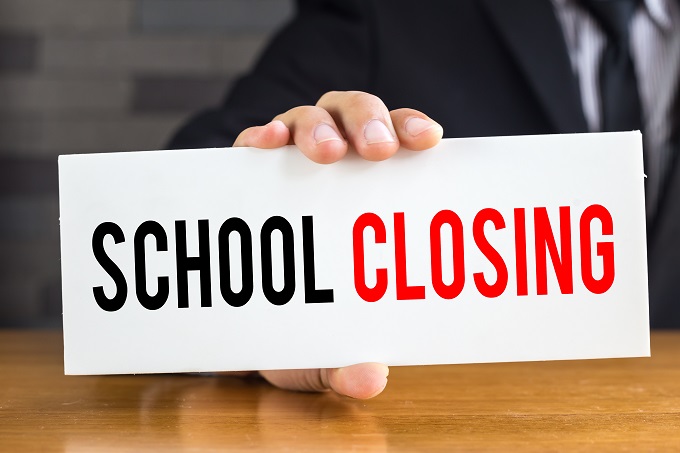
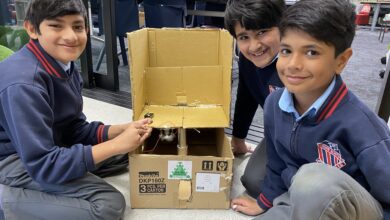


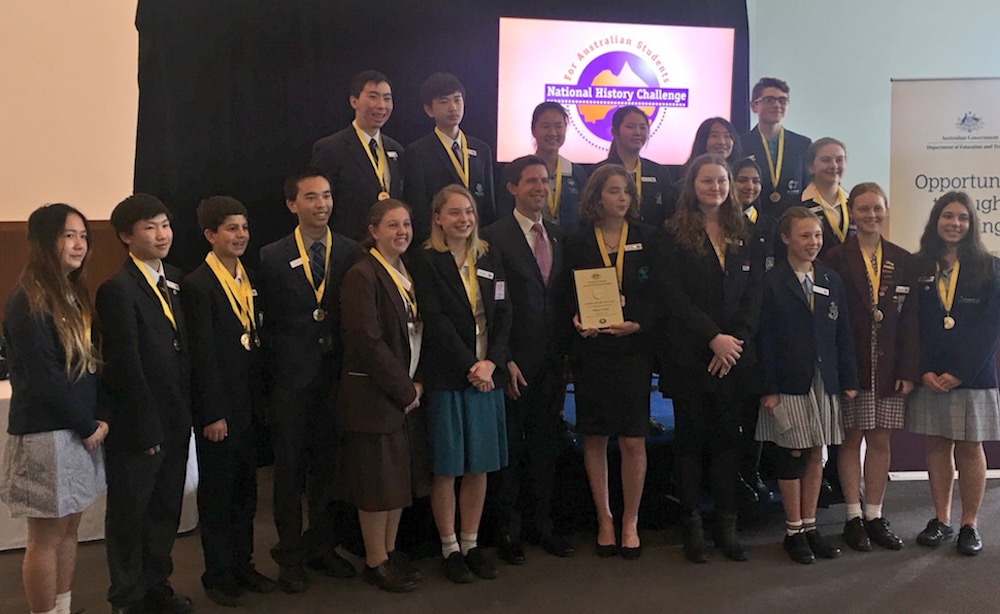

This story brings tears to my eyes……. what a blessed teacher and project!